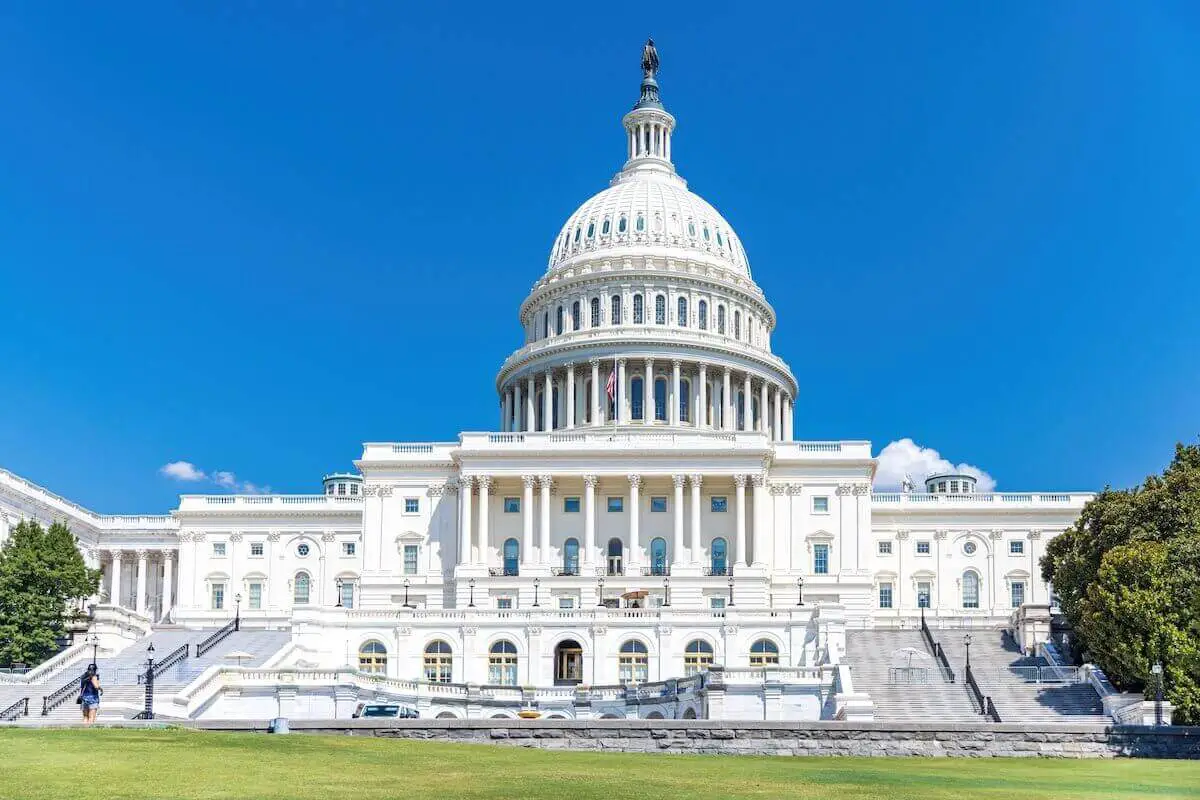The first round of bills that target federal employees have been introduced in the new Congress since it was seated on January 3, 2025. The bills are not new, but may have more significance with a new administration in Washington.
Telework
Whether or not federal employees should be allowed to telework has become a contentious political issue, and Republicans are generally not in favor of it. President-elect Trump has gone on the record as saying that federal employees must return to the office or that “they’re going to be dismissed.”
Return to Work Act
The Return to Work Act (H.R. 107) was reintroduced by Congressman Andy Biggs (R-AZ). It would require federal agencies to reinstate their telework policies to those in place on December 31, 2019, as they were used before the COVID-19 pandemic.
Federal Employee Return to Work Act
The Federal Employee Return to Work Act (H.R. 236) would exclude certain federal employees who telework at least once a week from receiving pay raises and higher locality pay for their office location being in a high-cost-of-living area despite working from home. Federal employees covered under the bill would be paid at the Rest of U.S. locality pay area rate under the General Schedule.
The bill was introduced last year by Senator Bill Cassidy (R-LA), who also introduced it (S. 27) in the new session of Congress. Congressman Dan Newhouse (R-WA) has introduced the House companion legislation (H.R. 236).
REMOTE Act
The Requiring Effective Management and Oversight of Teleworking Employees Act (REMOTE) Act (S. 21) was reintroduced in the new Congress by Senator Joni Ernst (R-IA).
It would require using software to monitor the computer use of federal employees working remotely and also set directives for the managers of those employees to periodically review the network traffic.
The legislation has reporting requirements as well. It would also require agency reports “which shall include a description of the adverse effects of telework policy on the performance of the executive agency, including any increased incidences of disciplinary actions against employees of the executive agency.”
Agencies would also be required to provide reports comparing the average login rates of teleworking employees working remotely to the total number of teleworking employees approved to be working remotely on that same day and average login rates of teleworking employees to employees who are working in agency headquarters buildings.
Locality Pay and Retirement
Senator Cassidy has also reintroduced the Federal Employee Locality Accountability in Retirement Act (S. 26). This bill would have a significant financial impact on federal employees’ retirement annuities.
The legislation would exclude locality pay when calculating retirement payments for federal employees enrolled in the Federal Employees Retirement System (FERS). This would have the net effect of cutting federal retirement annuities because locality pay is included in the high-3 calculation.
A federal employee’s basic annuity is computed based on his or her length of service and highest three years of average salary, including locality pay, during three consecutive years of federal service, so if locality pay were excluded from the computation, it would make a big difference in the amount of a federal employee’s monthly annuity payment.
According to a press release from Cassidy, there currently are approximately 1.2 million retired federal employees receiving a FERS annuity, and the average payment is $2,126 per month.
Relocating Federal Agencies Outside of Washington, DC
Senator Ernst also has reintroduced two bills that would require relocating federal agencies outside the DC area.
The Decentralizing and Reorganizing Agency Infrastructure Nationwide To Harness Efficient Services, Workforce Administration, and Management Practices (DRAIN THE SWAMP) Act (S. 23) would relocate at least 30% of D.C. headquarters to the states and require reduction of federal real estate in D.C. by at least 30%.
The DRAIN THE SWAMP Act also indirectly targets telework and locality pay. Any federal employees whose permanent duty stations were relocated by enacting the legislation would no longer receive Washington, DC area locality pay and would instead be paid at the locality pay rate of the new location. This would most likely amount to a pay cut since the Washington, DC locality area is one of the higher paying locality pay areas.
The bill adds that no relocation incentives would be paid and that any federal employees who were relocated would have to do so within 90 days of being notified that the locations of their permanent duty stations were changing.
Additionally, the bill stipulates that any federal employees who are relocated would not be allowed to work remotely on a full-time basis, and any federal employees who remained in the DC area would have to work in person 100% of the time.
This provision of the bill is likely aimed at stopping the potential for federal employees to live and work in areas with lower locality pay rates while collecting the higher pay rate from an area such as Washington, DC. Ernst has found multiple instances of this happening with the federal government’s expanded telework provisions that started during the COVID-19 pandemic in investigations that she has conducted.
The bill further stipulates that the unneeded office space created by the relocations would be sold off and reduced by at least 30%.
The Strategic Withdrawal of Agencies for Meaningful Placement (SWAMP) Act (S. 22) would relocate non-security federal headquarters outside D.C. and across the states.
The SWAMP Act would establish a bidding process for states and municipalities to compete for the relocation of a federal agency’s headquarters. Under current law, all departments and agencies of the federal government are required to be located in the District of Columbia, unless otherwise provided by Congress.
Companion legislation has been introduced in the House (H.R. 514) by Congresswoman Ashley Hinson (R-IA).
DOGE Acts
Congresswoman Claudia Tenney (R-NY) also reintroduced the DOGE Acts that she and Senator Marsha Blackburn (R-TN) introduced a few weeks ago in the previous session of Congress.
These are a group of four bills that are intended to support the efforts of the Department of Government Efficiency (DOGE) being led by Vivek Ramaswamy and Elon Musk.
Federal Freeze Act
The Federal Freeze Act (H.R. 200) would require a one-year freeze on pay increases for federal employees and direct agencies to cap their workforces over a three-year period, thereby decreasing the size of the federal workforce. The legislation would exempt certain employees deemed necessary to serve the interests of law enforcement, national security, public safety, and public health services.
Commission to Relocate the Federal Bureaucracy Act
The Commission to Relocate the Federal Bureaucracy Act (H.R. 202) would establish a commission to study relocating non-national security federal agencies outside of Washington, DC based on financial efficiency, existing infrastructure, and related industries.
Federal Employee Performance and Accountability Act
The Federal Employee Performance and Accountability Act (H.R. 201) would establish a pay for performance system for certain federal employees. There would be exemptions for national security or public safety.
A tiered salary increase structure would be established with three tiers:
- Tier 1: “Exceeds expectations” – Employees who significantly exceed established performance metrics could get pay raises of up to 10%, bonuses, and non-monetary awards such as flexible scheduling, telework options, technology upgrades or parking options
- Tier 2: “Meets expectations” – Agencies could not adjust the pay of employees in this category
- Tier 3: “Below expectations” – For employees who fail to meet established performance metrics, agencies would be required to cut their pay by 10% and provide training or develop opportunities to assist employees in improving their performance
Implementing DOGE Act
The Implementing DOGE Act (H.R. 199) would limit increases in non-security discretionary appropriations by requiring all increases in non-security appropriations above one percent to be rescinded on a prorated basis.
Why This Matters to Federal Employees
These bills have been introduced before. This time, however, there is a new administration in Washington. With a narrow Republican majority in both Houses of Congress and a Republican president, there is a greater likelihood that at least some of these proposals will become law.
A new initiative is coming along with the new administration: the Department of Government Efficiency (DOGE). Among its stated goals are to eliminate telework and reduce the size of the federal workforce. Several lawmakers have gotten behind the initiative, and Senator Ernst is one of them. In fact, she is the chair of the Senate DOGE Caucus.
DOGE has reportedly hired about 10 people so far and is operating out of an office located near the White House. While it has no direct authority to enact legislation or regulations, it indicates that the new administration is serious about its agenda and its intended effort to cut costs and make significant reforms.
It will not be an easy process, however. The Wall Street Journal noted in an article this week that eliminating federal agencies takes an act of Congress and that “odds of passing the Senate are near zero,” so Congress is going to be more likely to “chip away” at the power of federal agencies rather than try to eliminate them outright.
The same goes for federal regulations. WSJ noted in the article, “…Congress itself has authorized agencies to adopt regulations that implement legislation, and provided a mechanism for public and business input during the rule-making process.”
It added, “Under the Administrative Procedure Act, a 1946 law, federal agencies must follow specific steps to ensure transparency and provide notice before regulations are adopted or rescinded.”
However, the WSJ article did say that eliminating telework for federal employees would likely be an easier task to accomplish, but that bargaining agreements with federal unions will be an obstacle. Federal employee unions have been working to secure telework in their bargaining agreements in advance of Trump coming into office. AFGE’s agreement with the Social Security Administration was one of the most high-profile cases.
FedSmith.com author Ralph Smith is a former labor relations officer and has been involved with federal labor relations since 1973. He said recently in a discussion I had with him that any federal employees who are not in a bargaining unit could be required to return to in-office work, but it is a violation of labor law to breach collective bargaining agreements.
The Trump administration could order an end to telework anyway and then let the situation play out at the Federal Labor Relations Authority, and perhaps that is what will happen. He added that the end result of forcing an end to telework may be that federal employees who really do not want to return to the office and who happen to be eligible to retire may do so.
With the battle lines clearly drawn, 2025 is likely to be an interesting year for telework.





